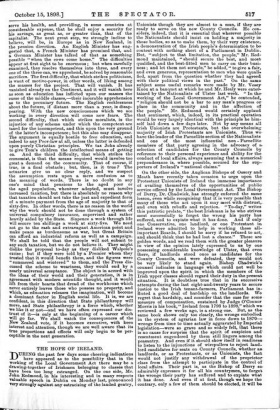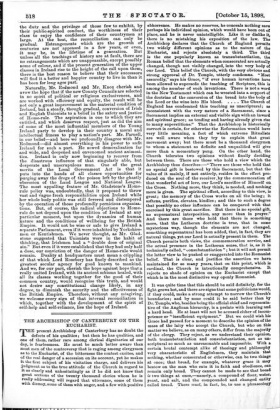THE HOPE OF IRELAND. D ITRING the past few days some
cheering indications have appeared as to the possibility that in the working of the Local Government Act there may be a drawing-together of Irishmen belonging to classes that have been too long estranged. On the one aide, Mr. John Redmond, in his interesting and in many respects valuable speech in Dublin on Monday last, pronounced very strongly against any ostracising of the landed gentry, Unionists though they are almost to a man, if they are ready to serve on the new County Councils. He con- siders, indeed, that it is essential that wherever possible the Nationalists should insist on holding a majority in those bodies, so as to make them, by their very existence, a demonstration of the Irish people's determination to be content with nothing short of a Parliament in Dublin- But, "subject to that limitation, the people," Mr. Red- mond maintained, "should secure the best, and most qualified, and the best-fitted men to carry on their busi- ness; and let them not scruple," he added, " to give a fair, and even generous, representation to men who were quell, fled, apart from the question whether they had agreed with their political views in the past." On the same subject some useful remarks were made by Mr. Vesey Knox at a banquet at which he and Mr. Healy were enter. tamed by the Nationalists of Ulster last week. "In the- working of the Local Government Act," he contended, "religion should not be a bar to any man's progress or place in the community and in the affection of the people." Mr. Redmond would certainly applaud that sentiment, which, indeed, in its practical operation would be very largely identical with the principle he him- self laid down a few days later. Not by any means all Irish Unionists are Protestants, but the overwhelming majority of Irish Protestants are Unionists. Thus we have the leader of the Parnellite section of the Nationalists and one of the most influential non - Parnellite members of that party agreeing in the advocacy of a., selection of candidates for the County Councils by reference to their personal experience and ability for the conduct of local affairs, always assuming that a numerical preponderance is, where possible, secured for the sup- porters of Ireland's "national claims."
On the other side, the Anglican Bishops of Ossory and Meath have recently taken occasion to urge upon the Protestant Unionists of Ireland the immense importance of availing themselves of the opportunities of public service offered by the Local Government Act. The Bishop of Derry, Dr. Chadwick, has strongly enforced the same lesson, even while recognising that it is very possible that many of those who act upon it may meet with distrust, and even with rebuffs and rejection. "To-day," writes this patriotic prelate, "the best Irishman is he who strives most successfully to forget the wrong his party has suffered, and to expiate what it has done. And if only one Conservative, one landlord, or one Protestant in Ireland were admitted to help in working these all- important Boards, I should be sorry if he refused to act, and should think that he had lost a chance." These are golden words, and we read them with the greater pleasure in view of the opinion lately expressed to us by one possessing considerable knowledge of Ulster, that even there, if landlords stood once as candidates for the County Councils, and were defeated, they would not be very likely to stand again. Bishop Chadwick's counsel indicates in language which could not well be improved upon the spirit in which the members of the Irish upper classes should regard their duty in the present situation. It is doubtless true that in its successive attempts during the last eight-and-twenty years to secure justice to the Irish tenant-farmers, Parliament has in- flicted a good deal of hardship on the landlords. We regret that hardship, and consider that the case for some measure of compensation, sustained by Judge O'Connor Morris in his book," Ireland from 1798 to 1898," which we reviewed a few weeks ago, is a strong one. But, as the same book shows only too clearly, the wrongs embodied in the system of agrarian law in force down to 1870— wrongs from time to time actually aggravated by Imperial legislation—were so grave and so widely felt, that there is no cause for surprise that the spirit of suspicion and resentment engendered by them still lingers among the peasantry. And even if it should show itself in readiness to listen to the injunctions of wirepullers to reject land- lord candidates for seats on County Councils, whether as landlords, or as Protestants, or as Unionists, the fact would not justify any withdrawal of the proprietor class from the attempt to participate in the control of local affairs. Their part is, as the Bishop of Derry so, admirably expresses it for all his countrymen, to forget the wrongs their party has suffered and to expiate what it has done. And even if at first, though we hope the contrary, only a few of them should be elected, it will be the duty and the privilege of those few to exhibit, by their public-spirited conduct, the worthiness of their class to enjoy the confidence of their countrymen at large. At the best, the reconciliation can only be gradual. Estrangements which are the growth of centuries are not appeased in a few years, or even, it may be, in the lifetime of a generation. But unless all the teachings of history are at fault, there are no estrangements which are unappeasable, except possibly some of colour, and if the present generation of the upper classes in Ireland rise to the height of the call upon them, there is the best reason to believe that their successors will find it a better and happier country to live in than it has been for long ages past.
Naturally, Mr. Redmond and Mr. Knox cherish and avow the hope that if the new County Councils are selected in no spirit of political or religious exclusiveness, and are worked with efficiency and equity, the result will be not only a great improvement in the material condition of Ireland, but a steady, though gradual, conversion of Irish and English Unionists to a belief in the safety and justice of Home-rule. The aspiration is one to which they are entitled, and which deserves respect, just as did the aim of some of the most influential members of the Young Ireland party to develop in their country a moral and intellectual fitness to play a nation's part. Mr. Parnell, in our belief—and here we profoundly disagree with Mr. Redmond—did almost everything in his power to unfit Ireland for such a part. He sowed demoralisation far and wide, and deepened and envenomed ancient animosi- ties. Ireland is only now beginning to recover from the disastrous influence of that singularly able, but desperate and unscrupulous man. One of the great merits of the Local Government Act is that it puts into the hands of all classes opportunities for purging away the dregs of the poison left by the ghastly obsession of the Laud League and National League. The most appalling feature of Mr. Gladstone's Home- rule policy was, undoubtedly, that it proposed to throw vast and vague fresh responsibilities upon Ireland while her whole body politic was still fevered and distempered by the operation of those profoundly pernicious organisa- tions. But, of course, the radical objections to Home- rule do not depend upon the condition of Ireland at any particular moment, but upon the dynamics of human nature and the conditions of wellbeing for the British Empire. It would not be wise or safe to give Ireland a separate Parliament, even if it were inhabited by Yorkshire- men or Kentishmen. We never thought, as Mr. Glad- stone suggested that Unionists were in the habit of thinking, that Irishmen had a "double dose of original sin." But even if it were established that they had only half a dose, our conviction of the danger of Home-rule would remain. Duality at headquarters must mean a crippling of that which Lord Rosebery has finely described as the greatest secular agency for good known to mankind. And we, for our part, cherish the hope against hope that a really united Ireland, with its ancient schisms healed, with all its classes working together for the good of their common country, would recognise this truth, and would not desire any constitutional change likely, in any degree, to diminish the security and the effectiveness of the British Empire. Therefore, without any misgiving, we welcome every sign of that internal reconciliation in which, together with the development of the spirit of self-help and self-reliance, lies the hope of Ireland.







































 Previous page
Previous page